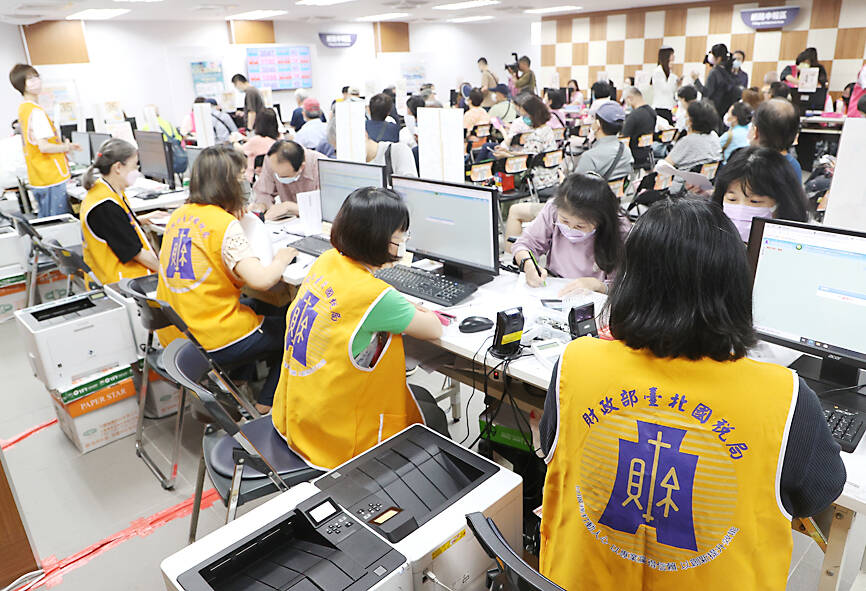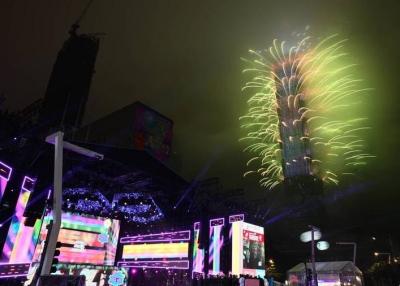The basic living expense tax deduction has been raised to NT$210,000 (US$6,457) from NT$202,000 and is to be applicable during the tax season in May next year, the Ministry of Finance said yesterday.
The ministry announced the adjustment on its Web site, saying that the move is expected to benefit about 2.08 million households, while affecting the nation’s tax income by NT$2.6 billion (US$79.9 million).
The Taxpayer Rights Protection Act (納稅者權利保護法) came into effect at the end of 2017, which stipulates that people should not be taxed on the amount they need to cover basic living expenses.

Photo: CNA
The basic living expenses are set at 60 percent of the median disposable income per capita from the preceding year, the ministry said.
A survey released on Aug. 16 by the Directorate-General of Budget, Accounting and Statistics showed that the median disposable income last year was NT$349,359, making the basic living expenses NT$210,000.
The deduction, which can be applied to taxpayers and each of their dependents, is NT$8,000 more than last year, the ministry said.
Meanwhile, the ministry on Nov. 23 last year announced that it would increase other income tax deductions this year to help ease people’s financial burden amid inflationary pressure, which would lower the nation’s tax income by NT$21.7 billion when people file their taxes next year, it had estimated.
It came as the rise in the consumer price index had exceeded the standard 3 percent for adjustments of tax exemptions, standard deductions, special deductions for salary income and for people with physical and mental disabilities, as well as tax brackets, the ministry said.
These tax exemptions and deductions are to cost state coffers NT$24.3 billion in total, it said.

The Taipei MRT is open all night tonight following New Year’s Eve festivities, and is offering free rides from nearby Green Line stations. Taipei’s 2025 New Year’s Eve celebrations kick off at Taipei City Hall Square tonight, with performances from the boy band Energy, the South Korean girl group Apink, and singers Gigi Leung (梁詠琪) and Faith Yang (楊乃文). Taipei 101’s annual New Year’s firework display follows at midnight, themed around Taiwan’s Premier12 baseball championship. Estimates say there will be about 200,000 people in attendance, which is more than usual as this year’s celebrations overlap with A-mei’s (張惠妹) concert at Taipei Dome. There are

NEW YEAR’S ADDRESS: ‘No matter what threats and challenges Taiwan faces, democracy is the only path,’ William Lai said, urging progress ‘without looking back’ President William Lai (賴清德) yesterday urged parties across the political divide to democratically resolve conflicts that have plagued domestic politics within Taiwan’s constitutional system. In his first New Year’s Day address since becoming president on May 20 last year, Lai touched on several issues, including economic and security challenges, but a key emphasis was on the partisan wrangling that has characterized his first seven months in office. Taiwan has transformed from authoritarianism into today’s democracy and that democracy is the future, Lai said. “No matter what threats and challenges Taiwan faces, democracy is the only path for Taiwan,” he said. “The only choice

CORRUPTION: Twelve other people were convicted on charges related to giving illegal benefits, forgery and money laundering, with sentences ranging from one to five years The Yilan District Court yesterday found Yilan County Commissioner Lin Zi-miao (林姿妙) guilty of corruption, sentencing her to 12 years and six months in prison. The Yilan District Prosecutors’ Office in 2022 indicted 10 government officials and five private individuals, including Lin, her daughter and a landowner. Lin was accused of giving illegal favors estimated to be worth NT$2.4 million (US$73,213) in exchange for using a property to conduct activities linked to the 2020 Chinese Nationalist Party (KMT) presidential and legislative election campaigns. Those favors included exempting some property and construction firms from land taxes and building code contraventions that would have required
TECH CORRIDOR: Technology centers and science parks in the south would be linked, bolstering the AI, semiconductor, biotech, drone, space and smart agriculture industries The Executive Yuan yesterday approved a “Southern Silicon Valley” project to promote the development of an artificial intelligence (AI) and semiconductor industry in Chiayi County, Tainan, Pingtung County and Kaohsiung. The plan would build an integrated “S-shaped semiconductor industry corridor” that links technology centers and science parks in the south, Executive Yuan spokesperson Michelle Lee (李慧芝) said yesterday after a Cabinet meeting. The project would bolster the AI, semiconductor, biotech, drone, space and smart agriculture industries, she said. The proposed tech corridor would be supported by government efforts to furnish computing power, workforce, supply chains and policy measures that encourage application and integration